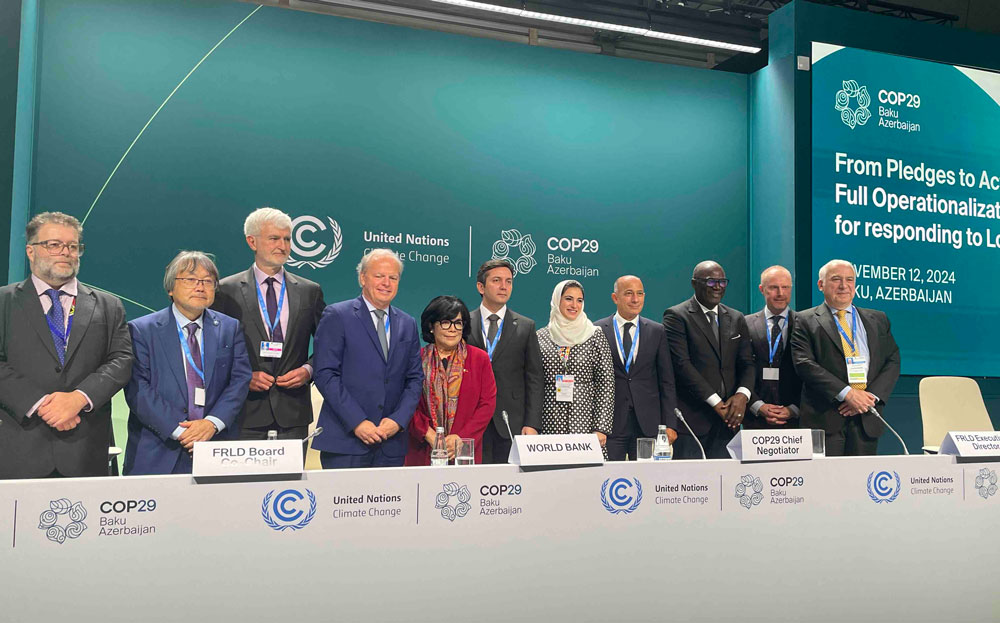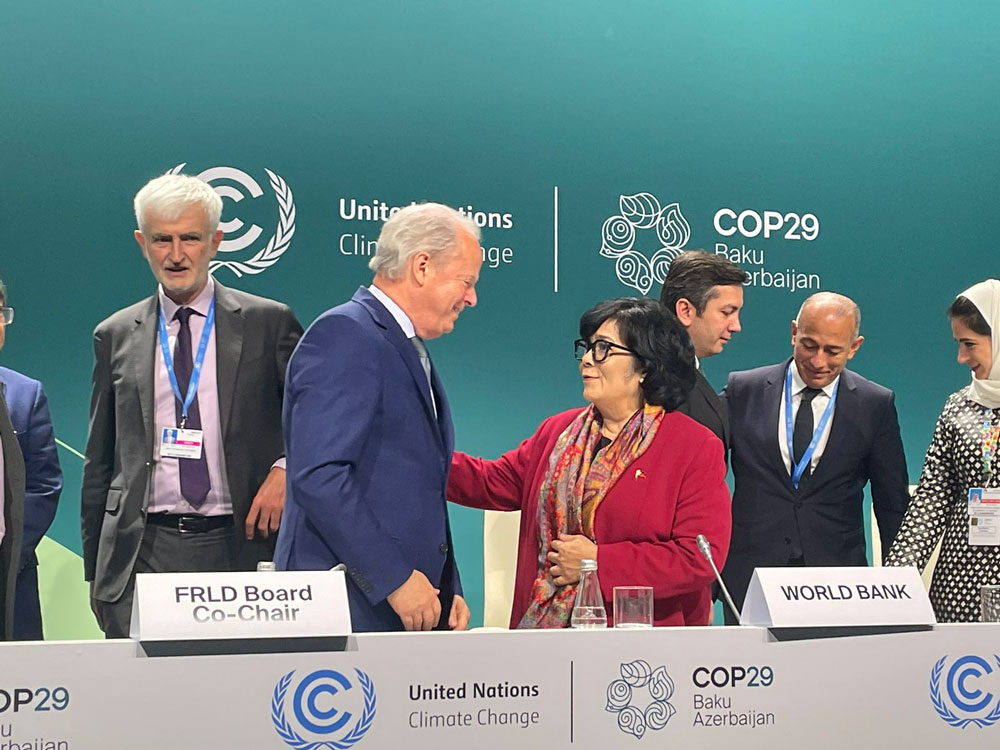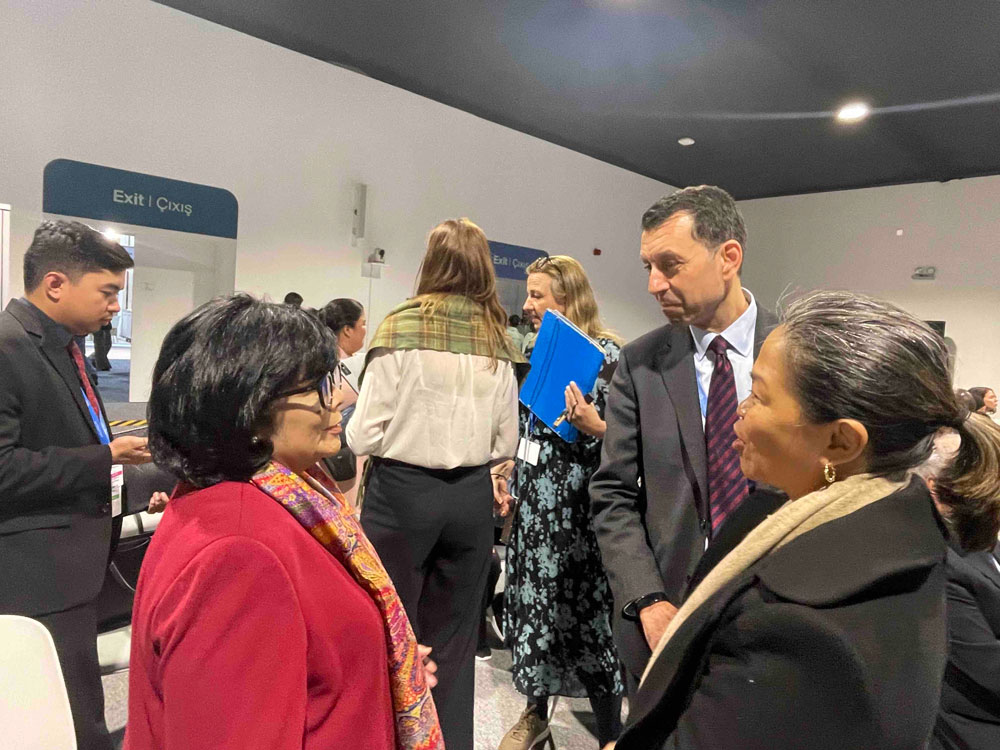
Baku, Azerbaijan – The Philippines and the Co-Chairs of the Fund for Responding to Loss and Damage (FrLD) signed the Host Country Agreement (HCA) on 12 November, Day 2 of COP 29. At the event “From Pledges to Action: Full Operationalization of the Fund for Responding to Loss and Damage” organized by the COP29 Presidency, the Department of Environment and Natural Resources (DENR) Secretary Maria Antonia Yulo Loyzaga and FrLD Co-Chairs Richard Sherman and Jean-Christophe Donnellier formally signed this groundbreaking agreement for the Philippines to host the FrLD Board.
The FrLD was established by the Conference of the Parties during 27th United Nations Climate Change Conference (COP27) in Sharm el-Sheik in 2023, and formally operationalizing in COP28 in Dubai, United Arab Emirates in 2024. The Host Country Agreement (HCA) is a critical element in the operationalization of the FrLD, and is key to unlocking funds to support the loss and damage needs of particularly vulnerable countries.
The Philippines first launched the campaign to host the FrLD Board at COP28. After successfully gaining a seat in the Board, the country was chosen as Host Country for the Board in its 2nd meeting on July 2024 in Songdo, South Korea. With swift and full support of both Houses of Congress, President Ferdinand R. Marcos, Jr. signed into law Republic Act No. 12019 known as the Loss and Damage Fund Board Act on 28 August 2024, granting legal personality and capacity to the FrLD Board. The HCA establishes the relationship between the FrLD Board and the Philippine Government, including the provision of privileges and immunities to the Board.
In her message during the event presided by COP 29 President Minister Mukhtar Babayev, and attended by UNFCCC officials and the World Bank (as FrLD Trustee), DENR Secretary Loyzaga stated that President Marcos sees the Philippines as a test case for the FrLD following the four successive tropical cyclones that hit the country in the past three weeks. The fifth has just made a landfall and the sixth is on the way.
“The Philippines may be a test case for the Fund in responding to this unique cumulative loss of lives and damage to critical infrastructure such as hospitals, schools, roads and water and power systems.
Our President wishes to inform the Parties of the deep devastation we are suffering from the unrelenting impacts of these typhoons and wishes for this unprecedented experience to serve as a baseline not only of what climate-vulnerable developing countries will endure in these uncertain and unpredictable times, but of our capacity to recover given the adequate and timely access to resources,” Secretary Loyzaga said.
“For the Philippines, living with risk and loss and damage has been part of our history as an archipelago. We therefore have a deep and personal stake in ensuring that the Fund for responding to Loss and Damage succeeds,” said Secretary Loyzaga.
The DENR Chief said that by hosting the FrLD Board, the Philippines has invested in its dynamic and far-reaching mission of cooperation and solidarity in making resources accessible to those who need it the most.
“While we know there may never be enough, the Fund will be critical in addressing the worst impacts of climate change and crucial in our communities as they rebuild, recover, and move toward a resilient future,” Secretary Loyzaga said.
“We therefore echo the COP28 President Sultan Ahmed al Jaber’s call to have pledges transform into contributions at the soonest time possible,” the Secretary added.
President Marcos looks forward to meeting the UNFCCC, the Co-Chairs, the Board, and with Loss and Damage Fund Executive Director Ibrahima Cheikh Diong to explore how the Philippines may work with the Fund to provide the necessary support during the FrLD’s 4th Board meeting in Manila on December 2 to 5 this year.
COP29 will run from 11- 22 November. Aside from agreements on the Just Transition, Adaptation Finance and on the establishing the framework for a global carbon market, the Parties are expected to agree to the New Collective Quantified Goal (NCQG). It is the new climate finance targets intended to replace the $100 billion per year goal set during the Paris Agreement and will expire in 2025. Recent estimates indicate that total global climate finance needs are over US$ 1 trillion annually. #
|
|
|















